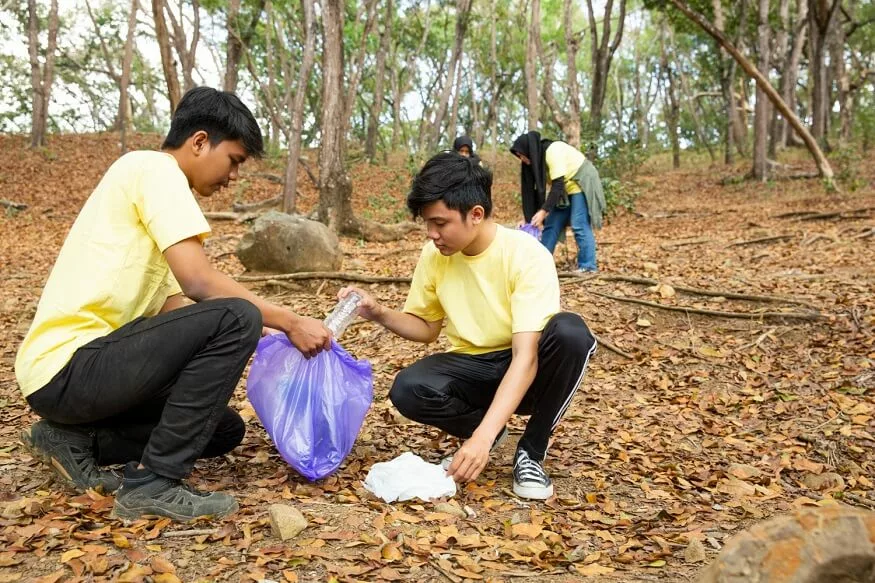Volunteering is an invaluable experience that offers numerous benefits, especially for students. Engaging in community and public services not only contributes to personal growth but also helps in developing essential skills, fostering social responsibility, and creating a positive impact on society. students should understand and perceive the benefits of volunteering as well as discuss various opportunities for volunteering in the community and public services.
Volunteering is known as the activity of offering your time, thoughts, or resources to benefit others without expecting to be appreciated in return. It is a means of influencing society positively, supporting communities, and tackling social challenges. It cultivates empathy, social responsibility, and a sense of purpose in children. Engaging in volunteer work helps students apply their knowledge in real life situations and develop communication skills with others. They also have a beneficial difference in the lives of other people by developing their character and beliefs.
Also Read : 10 Tips for Study Motivation for Students
Benefits of Volunteering for Students:
Here are some important benefits of volunteering
- Personal Development: Volunteering offers an opportunity for growth. It allows young individuals to discover their talents, build self-assurance and develop a sense of purpose and individuality. By participating in volunteer work students can explore themselves and their passions.
Looking to volunteer & its benefits? Explore various volunteer opportunities & make a positive impact on your community while gaining valuable experience. Volunteering offers an opportunity to enhance a wide range of skills. Leadership, teamwork, communication, problem-solving, and time management are all vital abilities that students may learn. These skills are transferable and highly beneficial for future academic and professional endeavours.
- Career Exploration: Volunteering helps students explore different career paths and gain practical insights into their areas of interest. By engaging in volunteer work related to their field of study or future career, students can assess their aptitude, develop industry connections, and make informed decisions about their future.
- Networking: Student volunteering provides a unique networking platform. Students can meet other students, professionals, and organisations that are passionate about community involvement. These connections can lead to mentorship opportunities, references, and even future employment prospects.
- Community Engagement: Volunteering allows students to actively engage with their community. They get a better awareness of local concerns, contribute to social change, and cultivate a feeling of civic duty through working on driven by community initiatives. This involvement promotes active citizenship and strengthens the fabric of society.
- Cultural and Social Awareness: Volunteering exposes students to diverse cultures, communities, and social issues. This exposure promotes cultural sensitivity, empathy, and a broader perspective on societal challenges. Students learn to value variety and acquire cross-cultural communication skills, all of which are essential in today’s linked society.
Also Read: Why Multilingualism is Crucial for Early Childhood Development
- Academic Enrichment: Volunteering complements academic learning by providing practical experiences. It allows students to apply theoretical knowledge in real-world contexts, reinforcing their understanding of concepts and theories. Moreover, volunteer work often involves research, data analysis, and problem-solving, which further enhances academic skills.
- Emotional Wellbeing: Volunteering improves one’s emotional wellbeing. It provides a sense of fulfilment, purpose, and satisfaction through making a difference in the survival of others. Student volunteering also builds thankfulness, decreases stress, and develops tolerance in the face of challenges in life.
- Global Perspective: Volunteering in the community and public services can extend beyond local boundaries. Students can join international volunteering programs, where they can contribute to global efforts while also obtaining a broader perspective on global concerns such as poverty, education, and environmental sustainability.
- Personal Fulfilment: Students see the good results of their efforts, feel the thanks of the people they assist, and acquire a stronger feeling of empathy and compassion. Volunteering fosters a lifelong dedication to service and creates a lasting legacy. This is perhaps the most gratifying aspect of volunteering.
Also Read : Motivation for not giving up: Tips and benefits for students
Ideas for Volunteering:
- Environmental Conservation: Students can engage in activities such as tree planting, beach cleanups, or wildlife conservation programs.
- Tutoring and Mentoring: Getting involved as a tutor or mentor, in schools or community centers offers the opportunity to assist students and provide guidance in their academic journeys.
- Homelessness and Poverty Relief: Volunteering for homeless shelters or food banks provides assistance to individuals in need and raises awareness about poverty related issues.
- Healthcare and Elderly Care: Students may help patients, careers, and the elderly by volunteering at hospitals, clinics, and nursing homes.
- Animal Welfare: Volunteering at animal shelters or rescue organizations allows students to care for and advocate for animals in need.
- Community Events and Festivals: Assisting in organizing and running community events, festivals, or fundraisers helps students contribute to community cohesion and celebration.
- Disaster Relief: Volunteering with organizations involved in disaster response and recovery efforts helps students assist during times of crisis.
- Youth Empowerment: Students can volunteer with youth organizations, after-school programs, or sports clubs, empowering and mentoring young individuals.
- Arts and Culture: Volunteering in museums, art galleries, or cultural centres promotes artistic expression and preservation of cultural heritage.
- Social Justice and Advocacy: Engaging with organizations focused on human rights, equality, and social justice enables students to advocate for positive change in society.
Also Read : Building Resilience and Coping Skills in Students
Parent’s Role in Volunteering:
- Lead by Example: Parents may set a good example by volunteering themselves and showing the value of providing to others.
- Communicate the Value: Explain to children the significance of volunteering and how it positively impacts individuals and society as a whole.
- Identify Interests: Encourage children to explore their passions and interests, and help them find volunteer opportunities aligned with those areas.
- Start Small: Begin with small volunteering tasks or projects to introduce children to the concept and gradually increase involvement as they become more comfortable.
- Make it Fun: Find engaging and enjoyable volunteer activities that match the child’s interests, ensuring they have a positive experience and develop a sense of fulfilment.
- Offer Choices: Involve children in the decision-making process, allowing them to choose the type of volunteer work or organization they want to support.
- Provide Support: Assist children in finding suitable volunteer opportunities, facilitating their involvement, and offering guidance throughout the process.
- Highlight Impact: Share stories or experiences of how student volunteering has made a difference, emphasizing the positive impact their contribution can have on others.
- Foster Empathy: Help children understand the needs of others by exposing them to diverse perspectives and encouraging compassion and empathy towards those less fortunate.
- Celebrate Achievements: Recognize and appreciate the child’s efforts and achievements in volunteering, reinforcing the importance of their contribution and encouraging continued involvement.
Also Read : Mnemonic Techniques for Memory Improvement of Students
Conclusion:
Volunteering offers students several advantages and chances. At EuroSchool, we value student involvement in voluntary activities since it not only enhances their lives but also helps the growth of society. Our confidence in the ability to change volunteering motivates us to encourage students to participate in meaningful service, allowing them to learn important skills, extend their perspectives, and establish a lifelong dedication to making a difference.










